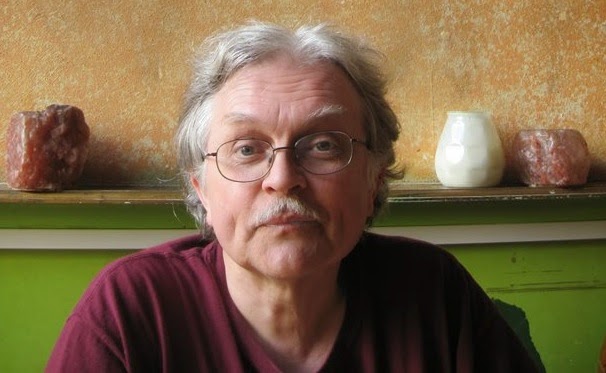Samuel Washington Allen Prize Honorable Mention, selected by Robert Pinsky
Add One Father to Earth
I.
Shelved where his shoes had been,
his unrested ashes waited in a black lidded box
in stout plastic held close in his vacant clothes closet
above the hamper where I threw the garments
he wore to ride in his final ambulance.
After sixteen weeks I carried them through the Florida city.
At the airport they were scanned with a smile for explosives.
In Massachusetts his ashes rode with us
past a weed-ridden car dealership.
No one but me remembers
the small-town lunch spot in that place. We scavenged
our first nothing-open-Sunday sandwiches there.
One last trip past that obliterated memory
on the way to the church of dwindling
recollections, church for thirty years before
my parents’ migration toward lawn egrets and ditches
for stormwater. Returned back from Paradise
to the church where my father troweled
my mother’s remains seven years before.
Where we then committed his. So much human grit.
Seventeen people stooped to the earth.
Now it settles in earth, uncoffined,
unmarked, fluid as matter through matter.
A remnant preserved for my desk
in a modest marble urn, before me
on a blue October with its stubborn
city greenness of trees.
II.
He lifted his free right arm
from beneath his hospital blanket.
Forced speechless by the apparatus
propelling his lungs, he opened his hand
toward us. His fingers curved one by one
in a cascade against his palm, little finger
rippling toward index finger.
He did this three times. We saw it,
the gentle opening and graceful closing
of his grip. We didn’t understand.
He then spread his palm to face us, moved it
side to side in-towards and out-away from him.
This we understood, because as children
we learned to wave when it was time
to go from someone.
But first, he spread and curled his fingers
to grasp no one’s offered hand.
I saw this and I blanked.
When I first held
the density of his remains, I realized
what he had asked of us.
I knew it only then.
III.
Sixteen weeks’ stillness on his closet shelf,
the closet in service to their bedroom.
Waking one morning, he told my mother he couldn’t
do it anymore, could not, could no longer
lift her, walk her, feed her.
A nursing home opened to her before sundown.
Sixteen weeks sacked
in resolute plastic necked by a dog tag
in a snap-brim box in a floral yellow shopping bag
of sympathy.
IV.
Famished family lost without lunch
in our new little town. Sunday noon
in 1963, Lord’s-Day-we’re-closed. Nothing
in the cupboard. The movers left us.
We’d hauled our trek from corn country Indiana
to tobacco shed Massachusetts,
the best asparagus earth on earth.
The Gronostalski onion truck, prodigious
Polish name festooned wide in paint
fading even then. Stan the Vegetable Man
whose beacon sign blazoned a man
figured, yes, of vegetables.
These decaying stalwarts still held the roadside
fifty years later, wayposts for homecomers.
But brand new then, still lunchless,
we roamed Route 9 in the red Rambler,
three cranky boys, two disoriented parents.
Who could tell how this little lunch place arose
like a vision, the Spruce Hill Restaurant,
a Brigadoon of sandwiches.
That eatery of the first day of the rest of our lives.
At some erased moment between then and now
the slope-roofed lunch box poked its sides out,
glassed its front to sell autos. Failed quickly.
There are its stubborn barren windows, shameless stains,
opportunist weeds: souvenir I remember and reject.
Something of my father goes for his final ride
past our first meal. And I want to challenge
someone: find the strength to take
this forsaken hulk, render it to atoms, lay it down.
V.
Grit the color of faint afterfeathers
in an equable porcelain bowl
set near dug-out earth.
A car radio edges the church sidewalk
beyond the garden. The thought
of entertainment by subwoofer serenade
frets me. And there is a lot of ash.
Four sons, two wives, two girlfriends, grandson,
each settles a ceremonial scoopful
in the empty space. Still there is much ash.
I call to the witnesses, make impromptu
community event of this. Four cousins,
two husbands, put their hands to the work.
Sister-in-law’s father and stepmother take it up.
Each in stillness with their minds arcing
toward the trowel, its mass.
Christ, there is so much ash left.
I squat, take the bowl at the lip,
empty his persisting remains
directly into the gape
like cups of flour into a mixing bowl.
I don’t want that image.
But maybe it is that image.
Add one father to earth.
Cover and let stand overnight.
Let stand permanently.
VI.
Let stand permanently,
that tablespoon-worth of him saved
before passage through the airport,
before passing the first-lunch ruin,
before the memorial garden.
Saved for a desktop urn, veined
in lightning bolts of rust-red with patches
of near-white like elderly skin.
Marble monument cool
against my palm, fingers wrap
like tendrils around the jar.
Fragment or fractal of the gravestone
he refused with adamance.
He would not be left as a site
of pilgrimage, a chiseled name
filled over time with lichen, a site
of contrite visits, first rare, then none.
Instead, he is at home with me
while my home persists,
before me in the shifting
late October sun. I close my eyes
against the waxing daylight,
open them upon his urn again
in the temporary darkness.

David P. Miller’s poems have recently appeared in Meat for Tea, Hawaii Pacific Review, Turtle Island Quarterly, Nixes Mate Review, The Lily Poetry Review, and What Rough Beast, among others. With a background in experimental theater before turning to poetry, David was a member of the multidisciplinary Mobius Artists Group of Boston for 25 years.
